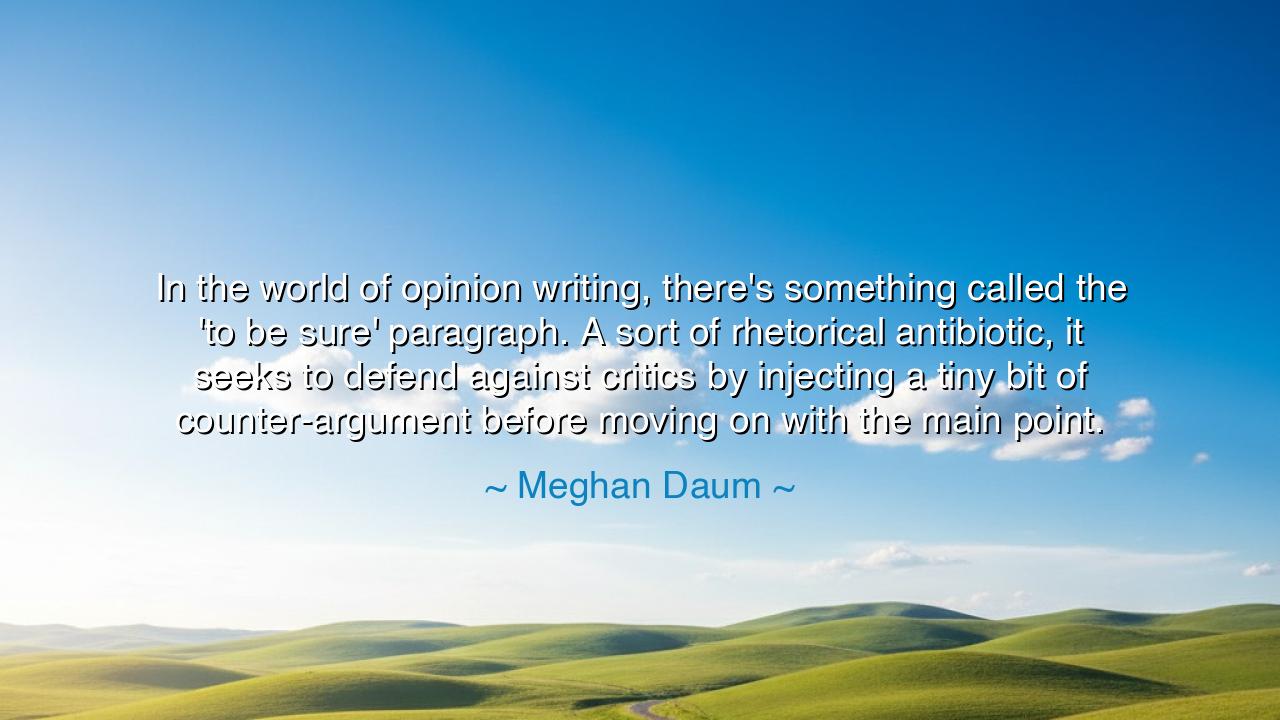
In the world of opinion writing, there's something called the
In the world of opinion writing, there's something called the 'to be sure' paragraph. A sort of rhetorical antibiotic, it seeks to defend against critics by injecting a tiny bit of counter-argument before moving on with the main point.






Hear the words of the essayist, Meghan Daum, who with wit and clarity revealed a subtle weapon of rhetoric: “In the world of opinion writing, there's something called the 'to be sure' paragraph. A sort of rhetorical antibiotic, it seeks to defend against critics by injecting a tiny bit of counter-argument before moving on with the main point.” At first, these words may seem to describe only the craft of writers, but in truth, they reveal something greater—the dance of human persuasion, the delicate balance between strength and concession, and the art of standing firm while acknowledging the winds that blow against you.
The meaning is this: in the realm of argument and persuasion, one must often face criticism. To ignore it entirely can make you appear blind or arrogant, but to yield fully is to abandon your cause. The “to be sure” paragraph is the artful middle path. It does not seek to overturn your argument, but to strengthen it, by showing that you have weighed the other side and found it wanting. Like a warrior who raises his shield to absorb the first blow before striking with his sword, so the writer acknowledges the counterpoint only to move past it with greater force.
The ancients practiced this art long before the phrase was born. Consider the speeches of Cicero, who often paused to grant his opponents a measure of credit before dismantling their arguments with eloquence. He knew that to persuade, one must appear fair. By conceding a little, he gained much, for his audience trusted him as balanced and thoughtful. His “to be sure” moments were not weakness but strategy—rhetorical antibiotics, as Daum calls them, strengthening his words against infection by doubt.
History, too, gives us the example of Abraham Lincoln, who in his debates with Stephen Douglas acknowledged the fears and concerns of his opponents. He did not dismiss them outright, but recognized their reasoning before showing why his own vision was nobler and more just. In doing so, he disarmed critics, gained credibility, and elevated the discourse. His arguments endured because they were not brittle—they bent, but did not break. Here lies the power of Daum’s insight: a small concession can make the whole edifice stronger.
And yet, Daum warns us of the danger hidden in this device. The “to be sure” paragraph can be used shallowly, a perfunctory nod to dissent with no real engagement, an empty ritual meant to ward off criticism without true thought. In such cases, it becomes hollow, a trick rather than wisdom. Like medicine administered without care, it may breed cynicism rather than strength. Thus, the wise writer and speaker must ensure that their acknowledgment of opposition is genuine, born of respect, even as they move forward with conviction.
The lesson is clear: in all matters of persuasion, whether with pen, voice, or deed, practice both confidence and humility. Do not fear to grant your adversary a fragment of ground, for in doing so, you show yourself neither afraid nor blind. But do not surrender your heart’s truth; acknowledge, then press forward with clarity. In this way, your arguments will stand not as brittle towers of pride, but as living fortresses, flexible and enduring.
Practical actions must follow. When you write or speak, pause to ask: What will my critics say? Address them briefly, sincerely, and with respect. Do not let your argument ignore the existence of the other side, but also do not let it be swallowed by endless concession. Train yourself in the art of balance, in giving just enough ground to strengthen your own. For whether in writing, debate, or daily life, this skill will win trust and multiply the power of your words.
For remember this eternal truth: to persuade is not only to speak your truth, but to show that you have considered the truth of others. As Meghan Daum teaches, the “to be sure” moment is no weakness, but a shield that makes your sword strike truer. Use it with wisdom, and your words will endure against the arrows of doubt, standing firm in the arena of ideas.






AAdministratorAdministrator
Welcome, honored guests. Please leave a comment, we will respond soon